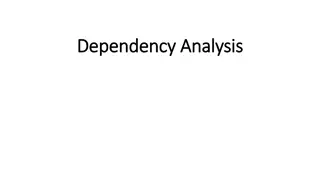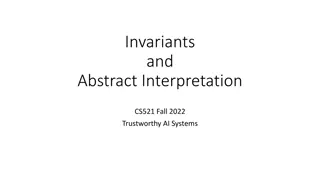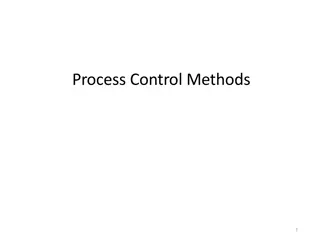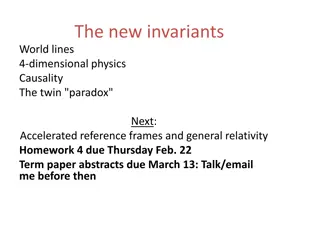
Optimizing Loop Development with Invariants
Discover the importance of invariants in loop development, including how to implement loops on integer ranges and handle loop variables effectively. Explore different techniques and best practices to enhance your loop programming skills and ensure the successful processing of integer sequences within specified ranges.
Download Presentation

Please find below an Image/Link to download the presentation.
The content on the website is provided AS IS for your information and personal use only. It may not be sold, licensed, or shared on other websites without obtaining consent from the author. If you encounter any issues during the download, it is possible that the publisher has removed the file from their server.
You are allowed to download the files provided on this website for personal or commercial use, subject to the condition that they are used lawfully. All files are the property of their respective owners.
The content on the website is provided AS IS for your information and personal use only. It may not be sold, licensed, or shared on other websites without obtaining consent from the author.
E N D
Presentation Transcript
Developing Loops from Invariants
Developing a Loop on a Range of Integers Given a range of integers a..b to process. Possible alternatives Could use a for-loop: for x in range(a,b+1): Or could use a while-loop: x = a; while x <= b: Which one you can use will be specified But does not remove the need for invariants Invariants: assertion supposed to be true before and after each iteration of the loop
Developing an Integer Loop (a) Suppose you are trying to implement the command Process a..b Write the command as a postcondition: post: a..b has been processed.
Developing an Integer Loop (b) Set-up using while: while k <= b: # Process k k = k + 1 # post: a..b has been processed.
Developing an Integer Loop (c) Add the invariant: # invariant: a..k-1 has been processed while k <= b: # Process k k = k + 1 # post: a..b has been processed. Note it is post condition with the loop variable
Developing an Integer Loop (d) Fix the initialization: Has to handle the loop variable (and others) init to make invariant true # invariant: a..k-1 has been processed while k <= b: # Process k k = k + 1 # post: a..b has been processed.
Developing an Integer Loop (e) Figure out how to Process k : init to make invariant true # invariant: a..k-1 has been processed while k <= b: # Process k implementation of Process k k = k + 1 # post: a..b has been .
Range Pay attention to range: a..b or a+1..b or a b-1 or This affects the loop condition! Range a..b-1, has condition k < b Range a..b, has condition k <= b Note that a..a-1 denotes an empty range There are no values in it a..b how many elements? b a + 1
Horizontal Notation for Sequences 0 <= sorted >= k len(b) b Example of an assertion about an sequence b. It asserts that: 1. b[0..k 1] is sorted (i.e. its values are in ascending order) 2. Everything in b[0..k 1] is everything in b[k..len(b) 1]
Algorithm Inputs We may specify that the list in the algorithm is b[0..len(b)-1] or a segment b[h..k] or a segment b[m..n-1] Work with whatever is given! h k b ? Remember formula for # of values in an array segment Following First e.g. the number of values in b[h..k] is k+1 h.
Example Question, Fall 2013 Final 0 k sorted pre: b 0 h k b[0..k] w/o duplicates Unchanged, values in b[h+1..k] 0 p h k post: b Unchanged, values all in b[h+1..k] b[p+1..k] w/o duplicates ??? inv: b Example: Input [1, 2, 2, 2, 4, 4, 4] Output [1, 2, 2, 2, 1, 2, 4]
Solution to Fall 2013 Final 0 p h k Unchanged, values all in b[h+1..k] b[p+1..k] w/o duplicates unchanged inv: b # Assume 0 <= k, so the list segment has at least one element p = h = # inv: b[h+1..k] is original b[p+1..k] with no duplicates # b[p+1..h] is unchanged from original list w/ values in b[h+1..k] # b[0..p] is unchanged from original list while :
Solution to Fall 2013 Final 0 p h k Unchanged, values all in b[h+1..k] b[p+1..k] w/o duplicates unchanged inv: b # Assume 0 <= k, so the list segment has at least one element p = k-1 h = k-1 # inv: b[h+1..k] is original b[p+1..k] with no duplicates # b[p+1..h] is unchanged from original list w/ values in b[h+1..k] # b[0..p] is unchanged from original list while :
Solution to Fall 2013 Final 0 p h k Unchanged, values all in b[h+1..k] b[p+1..k] w/o duplicates unchanged inv: b # Assume 0 <= k, so the list segment has at least one element p = k-1 h = k-1 # inv: b[h+1..k] is original b[p+1..k] with no duplicates # b[p+1..h] is unchanged from original list w/ values in b[h+1..k] # b[0..p] is unchanged from original list while 0 <= p:
Solution to Fall 2013 Final 0 p h k Unchanged, values all in b[h+1..k] b[p+1..k] w/o duplicates unchanged inv: b # Assume 0 <= k, so the list segment has at least one element p = k-1 h = k-1 # inv: b[h+1..k] is original b[p+1..k] with no duplicates # b[p+1..h] is unchanged from original list w/ values in b[h+1..k] # b[0..p] is unchanged from original list while 0 <= p: if b[p] != b[p+1]: b[h] = b[p] h = h-1
DOs and DONTs #1 DO use variables given in the invariant. DON T use other variables. # invariant: b[h..] contains the sum of c[h..] and d[k..], # except that the carry into position k-1 is in 'carry' while ___________ : # Okay to use b, c, d, h, k, and carry # Anything else should be local to while
DOs and DONTs #2 DO double check corner cases! h = len(c) while h > 0: What will happen when h=1 and h=len(c)? If you use h in c (e.g. c[h]) can you possibly get an error? # invariant: b[h..] contains the sum of c[h..] and d[k..], # except that the carry into position k-1 is in 'carry' while h > 0: Range is off by 1. How do you know?
DOs and DONTs #3 DON T put variables directly above vertical line. h i j k b <= x x ? >= x Where is j? Is it unknown or >= x?
Dutch National Flag Sequence of 0..n-1 of red, white, blue colors Arrange to put reds first, then whites, then blues Input is the list b of integers Modifies the list according to the invariant. 0 len(b) ??? pre: b 0 len(b) == 0 < 0 > 0 post: b 0 j k m len(b) == 0 ??? < 0 > 0 Inv: b
Dutch National Flag 0 j k m len(b) == 0 < 0 > 0 Inv: b ??? def dutch_national_flag(b): j = 0; k = 0; m = len(b) while k < m: if b[k] == 0: k = k + 1 elif b[k] > 0: _swap(b, k, m) m = m 1 else: # b[k] < 0 _swap(b, k, j) k = k + 1 j = j + 1
Dutch National Flag 0 j k m len(b) == 0 ??? < 0 > 0 Inv: b def dutch_national_flag(b): j = 0; k = 0; m = len(b) while k < m: if b[k] == 0: k = k + 1 elif b[k] > 0: _swap(b, k, m) m = m 1 else: # b[k] < 0 _swap(b, k, j) k = k + 1 j = j + 1 dutch_national_flag([3,- 1,5,-2,0]) k, j m k, j m 3 -1 5 -2 0 0 -1 5 -2 3 j k m 0 -1 j k 5 -2 3 m 0 j k m j k, m -1 5 -2 3 -1 0 -2 5 3 -1 -2 0 5 3






















